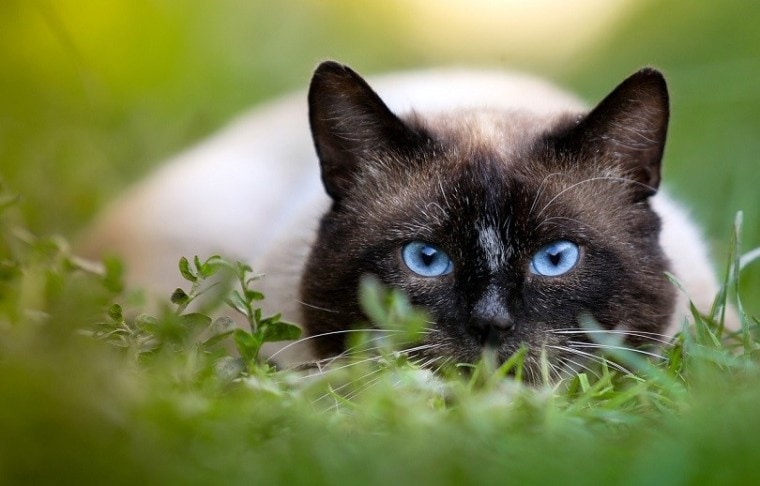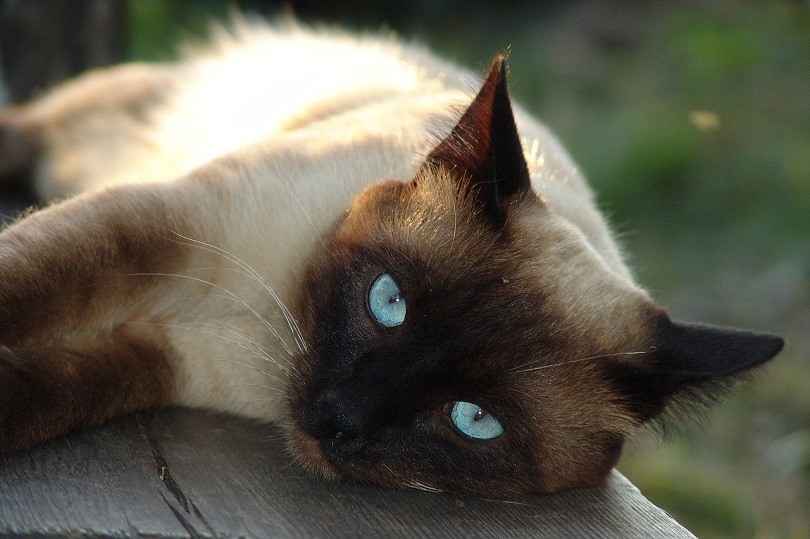
Siamese cats are iconic for their light brown body and dark brown socks and ears. They seem pretty furry, you wonder. Could they really, in fact, be hypoallergenic? Though no cat is purely hypoallergenic, Siamese cats are considered essentially hypoallergenic cats. They are not the most hypoallergenic breed, but people with mild to moderate cat allergies typically do well with them.
How could this be? Let’s find out.
No Cat Is Completely Hypoallergenic
Contrary to popular belief, it’s not simply the cat’s hair that’s bothering you. What actually makes allergy sufferers sneeze is a specific protein found in and on cats and dogs: the Fel d 1 protein. This protein is found at the base of a cat’s hair, in its urine and in its saliva.

Because cats usually have good control of where their pee and saliva go, these ways of spreading the offensive Fel d 1 protein are not an issue. It’s the hair that’s usually the culprit. If you have ever owned or been around where a shedding pet lives, you know that hair gets on every square inch of your house (and probably your car, too).
Since all cats produce this protein to some extent, no cat is truly and completely hypoallergenic. However, some cat breeds produce less amounts of this protein, or just shed less than other cats.
Why Siamese Cats Are Considered Hypoallergenic
Now let’s come back to the Siamese cats. It’s true, their coat of fur is on the longer side of the spectrum of cat hair. But the Siamese breed is known to produce less of the Fel d 1 protein responsible for irritating people’s allergies. This is the main reason why they are considered hypoallergenic.
 Are Siamese Cats Low Shedding?
Are Siamese Cats Low Shedding?
Another factor that influences a pet’s hypoallergenic qualities is the amount that it sheds. More shedding usually means more of the Fel d 1 protein being released. In this case, Siamese cats produce less of that protein and also shed less than other cat breeds. They still shed a little, though, which makes them not the most “hypoallergenic” cat breed out there.

Other Quick Facts About Siamese Cats
A Siamese cat can be your new best friend when you are looking for a cat with hypoallergenic qualities. These cats are extremely playful, loving, and loyal. Some would even call their behavior dog-like! For around $200, you can have your very own purebred Siamese kitten. Be sure to provide them with lots of entertainment, in toy form and with your attention.
What Is the Best Type of Cat to Get If You Have Allergies?
A 100% hypoallergenic cat is nonexistent, as we have already discussed. There are certain things to look for in a cat, though, if you want a cat that all people with all kinds of allergies can at least tolerate from a distance.
Hypoallergenic Qualities in Cats

Long-Haired
It would seem that cats with shorter hair would be more hypoallergenic than long-haired cats. Science actually proves the opposite. Since we already know that people aren’t necessarily allergic to the cat’s hair, the length of hair shouldn’t matter too much, right?
What has been discovered is that the Fel d 1 protein is contained within the skin and within the hair better when the cat hair is longer. This means less of the protein is released into the air or onto other objects.
Low Shedding
Cats that shed less will have less of a chance to release the Fel d 1 protein into the environment around it. So, it makes sense that a low shedding cat would have better hypoallergenic qualities than a high shedding one.
Female
Compared to their male counterparts, females make less Fel d 1. This means that, if you really want a cat, buying a female cat is preferable when you suffer slightly from cat allergies.
Outdoor
Part of the reason people get allergic reactions from pets is because the offending animal lives in the house. There’s no avoiding the Fel d 1 protein getting everywhere when your cat lives inside. One easy way to have less allergic reactions to cat hair is by keeping your cat outside, where they can spread that protein around without it bothering you or your guests.
The Best Hypoallergenic Cat Breeds
Cats That Are the Worst for Allergies
How to Deal With Cat Allergies
When you know that you have severe allergic reactions to cats, it’s best to cut your losses and stay away from them entirely. It’s not worth risking your health!
 Conclusion
Conclusion
It can be an ironically difficult life when you love cats but are also allergic to them. Depending on the severity of your allergies, you could still own a cat and remain healthy. One way is by purchasing a cat with hypoallergenic qualities, like the Siamese cat. Though they are not 100% hypoallergenic (no cat is), they are very low on the list of cat breeds that are offensive to allergy sufferers.
Related Reads:
- 26 Healthiest Cat Breeds – These Cats Rarely Get Sick (With Pictures)
- 13 Asian Cat Breeds (with Pictures)
Featured image credit: klimkin, Pixabay

 Are Siamese Cats Low Shedding?
Are Siamese Cats Low Shedding?



